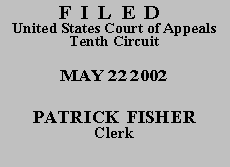

| RAFAEL A. RUIZ-GARCIA,
Petitioner - Appellant, v. MICHAEL A. LANSING, Commandant, USDB, Ft. Leavenworth, Kansas, and or successor in authority in office, Respondent - Appellee. |
|
Petitioner Rafael A. Ruiz-Garcia, a military prisoner, appeals from the district court's order dismissing his 28 U.S.C. § 2241 petition for writ of habeas corpus. We affirm.
Mr. Ruiz-Garcia, while serving in the United States Marine Corps at Camp Pendeton, California, pled guilty to and was convicted by a military judge sitting as a general court-martial, of theft and wrongful sale of military property, robbery, and assault. He was sentenced, inter alia, to eighteen years' imprisonment. Pursuant to the terms of a pretrial agreement, the convening authority suspended confinement in excess of twelve years.
The United States Navy-Marine Court of Criminal Appeals (NMCCA) conducted a de novo review of the court-martial's findings and sentence. Having considered Mr. Ruiz-Garcia's assertions of error, it affirmed the court-martial's findings and sentence. Mr. Ruiz-Garcia then sought review of the NMCCA's decision in the Court of Appeals for the Armed Forces (CAAF). The CAAF summarily denied his petition for review and his motion for reconsideration. It further denied his motion for leave to file supplemental assignments of error.
Mr. Ruiz-Garcia then filed an action in the NMCCA for extraordinary relief in the nature of a petition for writ of habeas corpus. In this petition, he raised the general claims that he subsequently presented in his federal habeas petition. The NMCCA denied the petition. Although it concluded that Mr. Ruiz-Garcia had essentially waived his contentions by failing to bring them during the course of his direct appeal, the NMCCA addressed each of his claims, finding that they lacked merit.
Mr. Ruiz-Garcia then brought this action in federal district court. In a carefully-reasoned and thorough decision, the district court concluded that he had failed to show his entitlement to habeas relief.
In this appeal, Mr. Ruiz-Garcia raises three issues. He contends, first, that his counsel and the prosecution coerced him into entering into a pretrial agreement. Second, he argues that the court-martial lacked jurisdiction over him. Finally, he contends that his counsel was constitutionally ineffective.
Our standard of review is an exceptionally narrow one. "[I]f the military gave full and fair consideration to claims asserted in a federal habeas corpus petition, the petition should be denied." Lips v. Commandant, United States Disciplinary Barracks, 997 F.2d 808, 811 (10th Cir. 1993). Issues that were not raised before the military courts will not be considered, unless the petitioner can show "both cause excusing the procedural default and actual prejudice resulting from the error." Id. at 812.
In determining whether full and fair consideration was given to an issue, federal courts apply a four-part test, examining whether "(1) the asserted error is of substantial constitutional dimension; (2) the issue is one of law rather than of disputed fact already determined by the military tribunal; (3) there are no military considerations that warrant different treatment of constitutional claims; and (4) the military courts failed to give adequate consideration to the issues involved or failed to apply proper legal standards." Id. at 811. We review the district court's application of these standards de novo. Monk v. Zelez, 901 F.2d 885, 888 (10th Cir. 1990).
Applying the above standards, the district court determined that Mr. Ruiz-Garcia was not entitled to habeas relief. We agree. The judgment of the United States District Court for the District of Kansas is therefore AFFIRMED for substantially the same reasons stated in the district court's Memorandum and Order of September 5, 2001.
Entered for the Court
Senior Circuit Judge
*. This order and judgment is not binding precedent, except under the doctrines of law of the case, res judicata, and collateral estoppel. The court generally disfavors the citation of orders and judgments; nevertheless, an order and judgment may be cited under the terms and conditions of 10th Cir. R. 36.3.